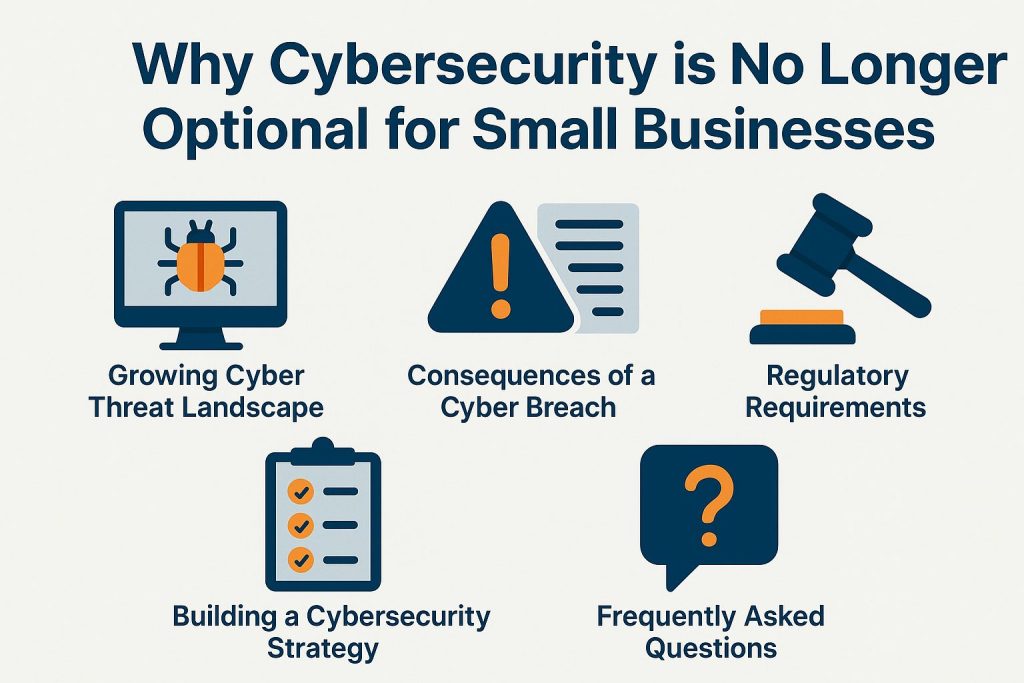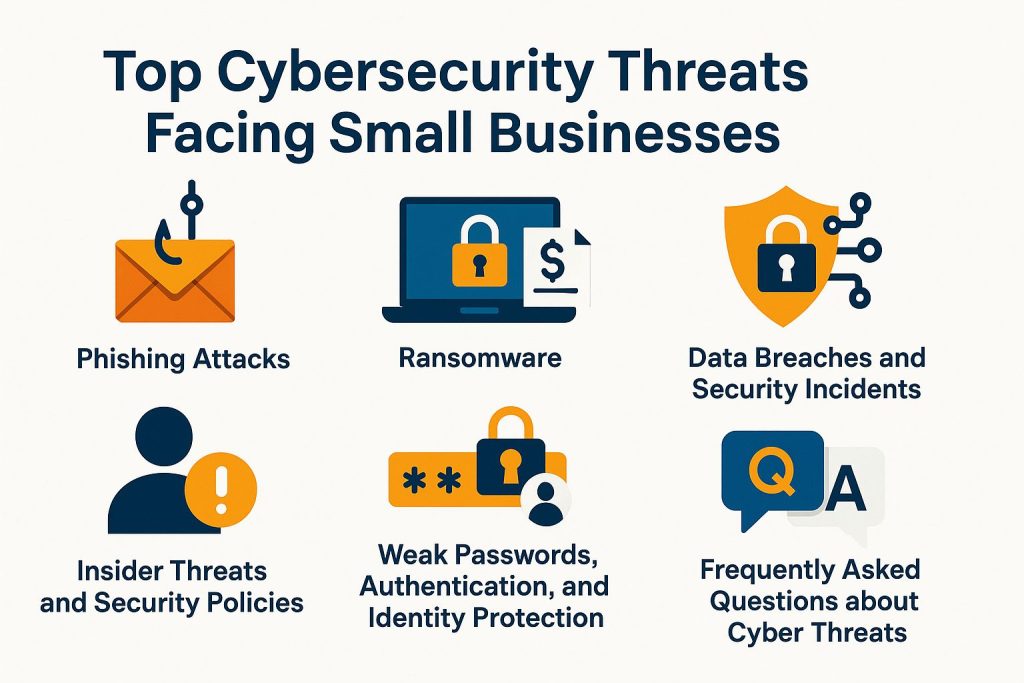Cybersecurity Best Practices Every Small Business Should Follow

Small businesses face many cyber threats today. These threats can harm their operations, finances, and reputation. These businesses must understand cybersecurity. Cyber attacks can have serious risks and consequences. This article presents essential cybersecurity best practices specifically designed for small businesses, including strong password protection, employee training, and effective data backup strategies. This article offers key cybersecurity best practices for small businesses. These include strong passwords, employee training, and data backup. Additionally, it explores key components of a robust cybersecurity plan, such as network security and encryption, to assist businesses in safeguarding against potential threats. By equipping themselves with the necessary knowledge, small businesses can better protect their operations and foster a safe online environment. Small businesses can protect their operations and create a safe online environment by gaining the right knowledge.
Importance of Cybersecurity for Small Businesses
Cybersecurity has emerged as a critical component for small businesses that increasingly depend on digital platforms, cloud security, and IT infrastructure for efficient operations. Cybersecurity is critical for small businesses. They rely on digital platforms, cloud security, and IT for efficient operations.
Given the notable rise in cyber threats, including data breaches and ransomware attacks, it is imperative for small businesses to implement robust cybersecurity measures. With the rise of cyber threats like data breaches and ransomware, small businesses must implement strong cybersecurity measures. If you are curious about how specific threats target local businesses, our analysis offers valuable insights. The consequences of failing to protect sensitive information can result in severe financial losses and significant reputational damage, underscoring the necessity for effective data protection strategies.
Furthermore, compliance with regulations such as GDPR and HIPAA is essential for safeguarding digital assets, thereby preserving customer trust and maintaining business integrity. Also, following regulations like GDPR and HIPAA is essential. This protects digital assets and keeps customer trust.
Risks and Consequences of Cyber Attacks
Cyber attacks pose substantial risks to small businesses, resulting in severe consequences that can range from financial loss to reputational damage. The growing sophistication of cyber threats renders every business vulnerable, particularly those with limited resources to defend against such attacks. Cyber threats are becoming more sophisticated. This makes every business vulnerable, especially those with limited resources.
A data breach has the potential to expose sensitive customer information, leading to monetary penalties and a significant loss of customer trust. Furthermore, non-compliance with legal frameworks can worsen these repercussions, highlighting the necessity for businesses to implement comprehensive cybersecurity strategies.
Among the various threats, phishing schemes remain prevalent and particularly dangerous, as attackers often manipulate employees into revealing confidential information. Additionally, malware can damage systems and steal data. Insider threats, whether malicious or unintentional, can also harm security.
These risks underscore the critical importance of diligent risk management practices. As small businesses navigate the complexities of compliance regulations, it is essential for them to understand that security incidents can result in significant financial consequences and a tarnished reputation, which may take years to restore.
Top Cybersecurity Best Practices for Small Businesses
To effectively mitigate risks and enhance cybersecurity, small businesses must adopt a comprehensive range of best practices tailored to their specific needs. To reduce risks and improve cybersecurity, small businesses must adopt a range of best practices that fit their needs. These practices should encompass all aspects of the business, including the implementation of strong data protection measures, threat detection systems, and ensuring that employees are educated about potential threats.
Employee training is key to cybersecurity. Awareness programs can greatly reduce phishing attacks. Furthermore, establishing a robust incident response plan is essential for minimizing damage in the event of a cyber attack, enabling businesses to recover swiftly while maintaining compliance with relevant regulations. This approach aligns with the principles outlined in our analysis of Disaster Recovery Planning for Greensboro Businesses.
Strong Password Protection, Two-Factor Authentication, and Regular Updates
Implementing strong password policies, including two-factor authentication, is a straightforward way to improve cybersecurity. Passwords should be complex, unique, and regularly updated to prevent unauthorized access to sensitive information.
Plus strong passwords, it is crucial to keep software updated with security patches, as outdated programs can serve as entry points for cyber threats. In addition to strong passwords, keep software updated with security patches. Outdated programs can be entry points for cyber threats. Emphasizing cyber hygiene ensures that all digital assets are safeguarded against potential vulnerabilities, thereby protecting the integrity of the organization’s data.
Password management tools simplify maintaining strong passwords. They generate and store complex combinations without memorization. Regular software updates fix security gaps and improve performance. They help systems run efficiently and support remote work security.
Integrating secure configurations into daily operations strengthens defenses. This is especially important for remote work security. Organizations must remain vigilant and promote security awareness. Each team member should understand the importance of these practices and contribute to a safer digital environment.
Employee Training and Awareness
Employee training and security awareness are key to a strong cybersecurity strategy for small businesses. Regular training helps employees recognize and respond to threats like phishing and social engineering.
Cultivating a culture of security awareness reduces the risk of insider threats and security incidents, thereby adopting a proactive stance toward cybersecurity challenges.
Specialized training programs, like phishing simulations, improve employees’ skills in identifying malicious emails. These targeted initiatives, paired with ongoing education, are crucial for reinforcing best practices and maintaining a strong awareness of security protocols.
Regular assessments keep employees vigilant and informed about the latest threats. They also help management evaluate training effectiveness. A commitment to continuous improvement safeguards sensitive information and empowers employees as key defenders against cyberattacks.
Data Backup and Recovery Plans
Strong data backup and recovery plans are vital for small businesses. They help minimize disruption during cyber attacks or data loss. Effective backup solutions include on-site and cloud storage. This provides redundancy and security for critical information.
A good disaster recovery plan helps businesses quickly restore operations. It protects digital assets and ensures compliance with data protection regulations.
Along with traditional methods, organizations should consider automated solutions to simplify data management and reduce human error. Systematic testing enhances compliance with data protection laws and creates a safety net for effective responses during unforeseen events.
An integrated approach to data protection reduces risks from operational interruptions and regulatory penalties.
Key Elements of a Strong Cybersecurity Plan
A strong cybersecurity plan has key elements that protect small businesses from cyber threats.
First, effective network security measures, like firewalls and endpoint protection, are essential to defend digital assets. Also, a comprehensive incident response plan helps organizations respond quickly and effectively to security breaches, thereby minimizing potential damage.
Other critical components include:
- Data protection strategies
- Established security policies
- Regular security audits to identify vulnerabilities and ensure compliance with industry regulations
For small businesses in Greensboro, leveraging budget-friendly IT solutions can be a hidden gem to bolster cybersecurity without straining resources.
Network Security and Firewalls
Network security is the first line of defense against cyber threats. Firewalls and antivirus software are crucial for this protection. Firewalls function as barriers between trusted and untrusted networks, filtering incoming and outgoing traffic based on predefined security protocols.
The implementation of effective access control and endpoint protection strengthen network security. They ensure only authorized personnel access sensitive data. This layered security is essential for business integrity and protecting digital assets.
There are various types of firewalls, including:
- packet-filtering firewalls
- stateful inspection firewalls
- next-generation firewalls
Each firewall type has unique configurations. These are tailored to specific network needs. For example, next-generation firewalls not only filter traffic but also incorporate features such as intrusion prevention systems and application awareness.
Robust security protocols are vital. They provide essential guidelines for securing communications and data exchanges. Regular security assessments and updates help identify vulnerabilities and ensure firewalls work optimally, thereby enhancing overall network resilience against emerging threats and supporting overall IT infrastructure security.
Encryption and Data Protection in Cybersecurity Frameworks

Encryption improves data protection. It keeps sensitive information secure even if intercepted by cybercriminals. By converting data into a coded format, encryption safeguards digital assets during transmission and storage, making it nearly impossible for unauthorized users to access or manipulate the information.
Implementing secure file-sharing practices among employees fosters data integrity. This is essential for compliance with regulatory requirements and security guidelines. It protects files and enhances organizational security by minimizing vulnerabilities.
Various methods, such as symmetric and asymmetric encryption, are employed to address differing requirements. Methods like symmetric and asymmetric encryption address different requirements. They provide solutions from simple email encryption to securing complex cloud environments. A thorough understanding of these diverse techniques enables teams to effectively select the most appropriate approach for their data protection strategy and manage cyber risk more effectively.
With the rise of remote work, leveraging secure file-sharing solutions, alongside robust mobile device management, has become imperative, ensuring that files exchanged between colleagues remain confidential and intact. This commitment reinforces the organization’s dedication to safeguarding sensitive information and promoting online safety.
Monitoring Services and Incident Response
Effective network monitoring and security tools are crucial for detecting potential threats. Continuous analysis of network traffic and user behavior helps identify unusual activities that may signal a breach.
When paired with a well-defined incident management plan, this proactive approach enables businesses to swiftly mitigate risks and minimize the damage caused by cyber attacks. Regular security audits and vulnerability assessments further bolster an organization’s ability to respond effectively to incidents and ensure breach response readiness.
The implementation of advanced network monitoring tools provides real-time insights into network performance and security posture, enabling teams to recognize and react to threats as they emerge. These tools should be integrated with a comprehensive incident reporting strategy that outlines clear protocols for identifying, classifying, and addressing security breaches.
Best practices, such as establishing clear communication channels, conducting regular cybersecurity training for employees, and performing post-incident reviews, are critical components of a robust security framework and contribute to overall cybersecurity awareness programs.
By fostering a culture of preparedness and effectively leveraging technology, organizations can significantly enhance their cyber resilience against digital threats and technological safeguards, ensuring a strong defense against ongoing cybersecurity challenges.
Frequently Asked Questions
What are the best cybersecurity practices for small businesses?
Some of the most important cybersecurity best practices for small businesses include using strong passwords, implementing regular software updates, and training employees on security protocols and cybersecurity policies.
Why is it important for small businesses to follow cybersecurity best practices?
Following best practices helps prevent data breaches. It protects your business from financial and reputational damage. Investing in cyber insurance can further mitigate risks.
How can small businesses ensure their data is protected from cyber threats?
Small businesses should back up their data regularly. Store it in a secure location. Implement secure payment processing. Use encryption to protect sensitive information. It’s also important to have a plan for responding to potential cyber attacks. Ensure business continuity planning.
What measures should small businesses take to protect against phishing scams?
Small businesses should educate their employees about how to identify and avoid phishing scams, as well as use email filters and security software to block potential threats. It’s also important to verify the legitimacy of suspicious emails. Check requests for sensitive information. Ensure strong email security.
Are there any specific industry regulations that small businesses should be aware of when it comes to cybersecurity?
Depending on the industry, small businesses must understand these regulations. Compliance helps avoid legal and financial consequences, and ensure regulatory compliance.
What should small businesses do if they suspect a cyber attack or data breach?
If a small business suspects a cyber attack or data breach, they should act quickly to contain the damage and notify any affected parties. It’s also important to conduct a thorough investigation to determine the cause of the breach and take steps to prevent it from happening again in the future. Use endpoint security measures to enhance protection.




